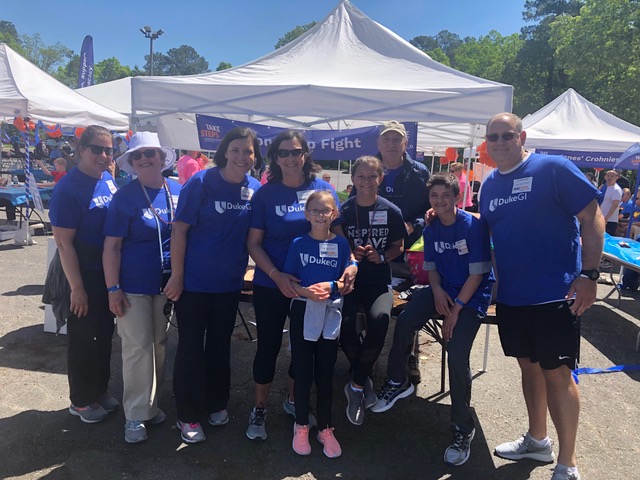
A Silent Illness
Patient gives a voice to those living with Crohn's disease
By Mary-Russell Roberson
Photography by Ken Huth
Published as part of the Winter 2022 issue of Duke Children's Stories
Fifteen-year-old Sarah Drury excels in her honors and AP classes and enjoys sailing and cheerleading. She serves as secretary for her school’s Zonta Leadership Club, participates in Teens for Health Youth, and is a legislator for a 2022 Youth in Government team. Sounds like normal teenage stuff–but she doesn’t take any of it for granted.
When she was younger, Sarah frequently sat and watched while her friends played. “I didn’t have a lot of energy,” she said. “But now I can do everything I’ve always wanted to do.”
For that she and her family credit her care team at Duke Children’s, including Nancy McGreal, MD, associate professor of medicine and pediatrics. “Dr. McGreal and her staff and everybody at Duke have been exceptional,” said Sarah’s father, Dan Drury.
FINDING A CONNECTION
As a child, Sarah had a puzzling series of symptoms, including eye ulcers, cavities, thrush infections in her mouth, a painful skin condition on her legs called erythema nodosum, stomach aches, constipation, diarrhea, anemia, and even
stunted growth.
Sarah’s doctors at the time treated each complaint individually without realizing the connection. It was years before her pediatricians realized there might be a medical condition underlying all the problems and recommended that her family take her to a pediatric gastrointestinal (GI) specialist. At age nine, she finally learned she had Crohn’s disease, a type of inflammatory bowel disease (IBD) that causes chronic inflammation in the digestive tract. Crohn’s disease can cause autoimmune processes in other organ systems, which led to some of Sarah’s seemingly disparate symptoms.

"Once we got the medicines right, she was absorbing nutrients and doing well. She's grown into a beautiful young woman."
TEAM SUPPORT FOR SARAH
After her diagnosis, Sarah’s parents did extensive research to find the best doctor for their daughter, and they chose McGreal at Duke Children’s. They’ve been visiting her regularly ever since, at least twice a year.
The Drury family lives in Bluffton, South Carolina, a five-and-a-half-hour drive away from Duke Children’s in Durham, North Carolina, but they don’t mind making the trip. “I would drive 10 hours for the care they give,” Sarah said. “At Duke, I have this great support system.”
Sarah’s support team at Duke includes a nurse clinician, Faye Ubinger, RN. When patients are first diagnosed, Ubinger spends a lot of time listening and teaching them about their disease and treatment. She also helps coordinate multiple appointments for doctor visits and tests, working to schedule things back-to-back for the convenience of families like the Drurys who are coming from out of town. Between appointments, Ubinger answers questions families have when symptoms or side effects crop up. “Dr. McGreal and Miss Faye are just incredible,” Sarah said. “I would not be how healthy and happy I am if I didn’t have them.”
ACHIEVING REMISSION
There is no cure for Crohn’s, but McGreal wants patients like Sarah to experience subjective and objective remission of disease. That means they feel good on the outside and look good on the inside—no inflammation in the gastrointestinal tract. “As long as you keep [the disease] controlled,”McGreal said, “most people live a long fruitful life
without major complications, issues, or problems.” Because every patient is different, it can be challenging to find the medicines that are best for each patient. In Sarah’s case, what works for her is an injection twice a month of an immune- suppressing drug and weekly pills.
Prior to diagnosis and treatment, Sarah suffered stunted growth. For two years, she wasn’t growing, according to her mother, Kathy Drury, and was undersized as a result. McGreal explains that the chronic inflammation caused by Crohn’s disease can divert available nutrients and resources as the body tries to quell the inflammation, even at the expense of growth and puberty. With effective treatment, Sarah began growing again, gaining both height and weight.
“The physical transformation is miraculous,” Kathy said. “Once we got the medicines right, she was absorbing nutrients and doing well. She’s grown into a beautiful young woman.” Besides getting back on track with her growth, Sarah now knows what it is like not to feel tired or sick. She can eat full meals with no problem and has the energy to participate in activities and sports.
That’s exactly what McGreal was aiming for. “Our goal is to get the patient to the point where their symptoms are so well controlled, they don’t really feel like they have an illness,” she said. Treatment not only reduces present-day
symptoms, it also reduces risk for future problems, including flare-ups, permanent damage to the intestines, and even colon cancer. McGreal strives to be proactive for her patients so that they don’t have to worry about these issues later in life.
HELPING OTHERS BY SHARING HER STORY
Crohn’s is not an easy disease to live with, physically or emotionally. Some of the symptoms are not only painful, inconvenient, or debilitating, but also deeply embarrassing. Nor is it an easy disease to talk about. “Patients have told me they look OK on the outside, but on the inside their intestines can be on fire and they can be struggling to hold bowel movements in when they need to go,” McGreal said. “It’s almost like a silent illness.”
Sarah has turned her struggles with Crohn’s into something positive. “She is taking what could be a negative aspect of her life and flipping it around and using it to push herself forward and achieve things,” McGreal said.
One of the ways Sarah is doing that is by talking about this “silent illness.”
In 2019, Sarah was named one of the Honored Heroes for the Triangle Take Steps fundraising walk for the Crohn’s and Colitis Foundation. Even though she was only 12, she gave a speech at the event, in which she explained how her
experience with Crohn’s disease had made her mentally stronger. She continues to advocate for Crohn's awareness and share her journey openly with others, including during the 2022 Season of Hope Radiothon on MIX 101.5.
Among the positives, she counts her mental fortitude, the opportunity to help others, and the support of her team at Duke Children’s. “Everyone there wants the absolute best for you—to grow, to be healthy, and to thrive,” Sarah said.

YOUR GIFT CREATES A BRIGHTER FUTURE FOR CHILDREN IN NEED
We appreciate gifts of any size, making sure that your generosity is used to advance medical care and provide a better tomorrow for our children. You can choose a dollar amount to give now, or continue exploring more ways that you can support Duke Children’s.